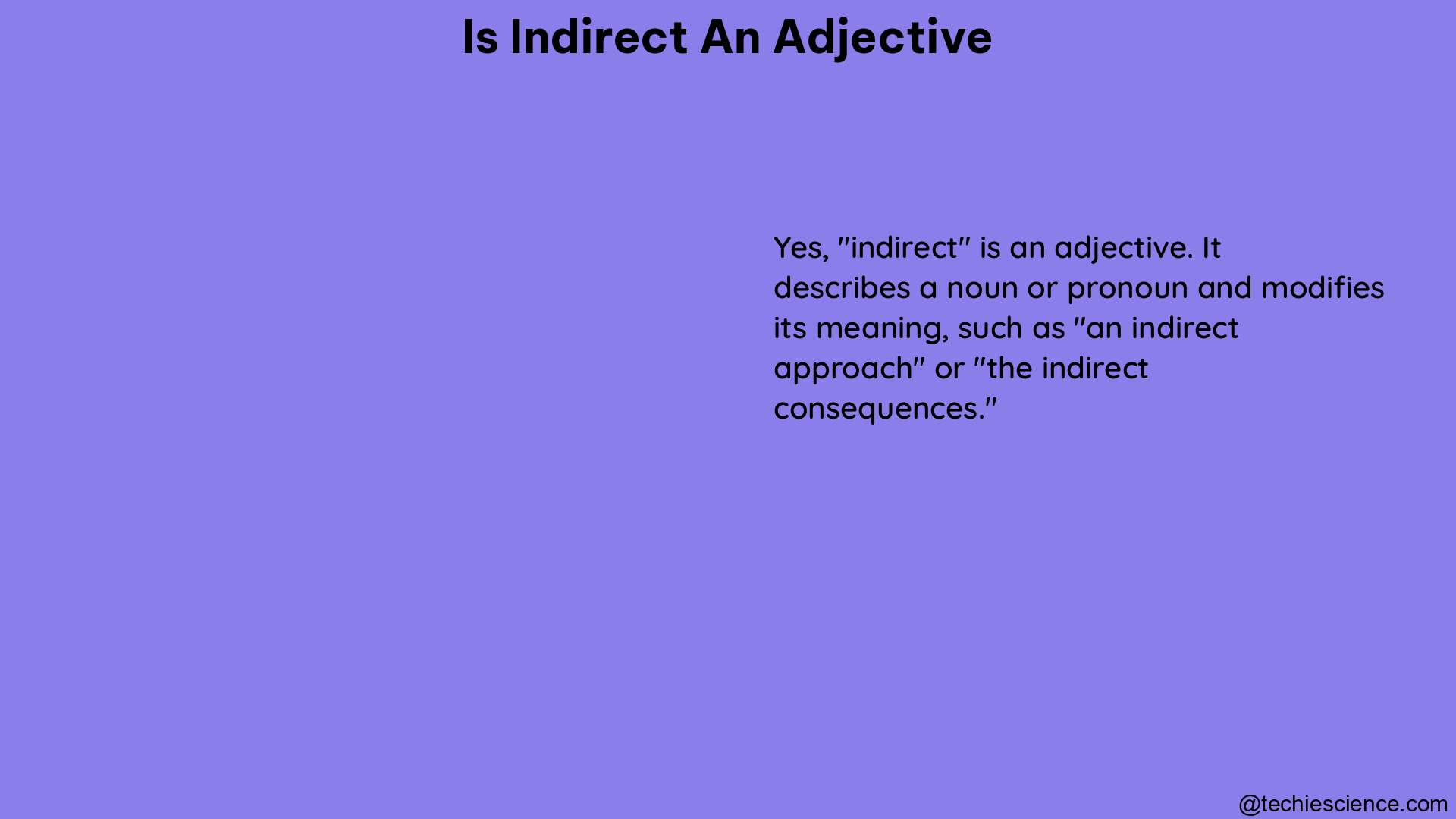Yes, “indirect” is an adjective. It has several meanings and uses, which are detailed below:
Grammatical Specification
- Pronunciation: /ˌɪndəˈrekt/, /ˌɪndaɪˈrekt/ (US and UK)
- Part of Speech: Adjective
Meanings and Examples

1. Happening in addition to an intended result
- The indirect effects of the war
- The building collapsed as an indirect result of the heavy rain
2. Avoiding clear and obvious communication
- Indirect criticism
- The comment was an indirect attack on the prime minister
3. Not going in a straight line
- An indirect route
- The plant prefers indirect sunlight
4. Not directly connected or aimed
- Indirect costs (e.g., training, heating, rent)
- Indirect government representation
Theoretical Explanation
The adjective “indirect” is derived from medieval Latin “indirectus,” which is a combination of “in-” (meaning “not”) and “directus” (the past participle of “dirigere,” meaning “to put straight”). This etymology reflects the core idea of “indirect” as something that deviates from a direct path or approach.
Advanced Details
Indirect methods
Finding something out through methods that are not straightforward or obvious.
Indirect discourse
A way of reporting speech where the original words are modified to fit grammatically into the sentence.
Indirect question
A question that is not asked directly but rather through implication or suggestion.
Technical Specifications
Grammatical Properties
- Part of Speech: Adjective
- Inflection: Indirect, more indirect, most indirect
- Adverb Form: Indirectly
- Synonyms: Circuitous, oblique, roundabout, tortuous, devious
Morphological Analysis
The word “indirect” is formed by the prefix “in-” (meaning “not”) and the root “direct,” which comes from the Latin word “directus” meaning “straight.” This combination suggests the core meaning of “indirect” as something that deviates from a straight or direct path.
Syntactic Usage
As an adjective, “indirect” can modify nouns to describe something that is not direct or straightforward. For example:
- The indirect approach to the problem was more effective.
- The indirect lighting in the room created a cozy atmosphere.
- Her indirect comments about the project were difficult to interpret.
“Indirect” can also be used in comparative and superlative forms:
- The indirect route was longer but more scenic.
- This is the most indirect way to reach the destination.
Semantic Nuances
The different meanings of “indirect” convey subtle shades of indirectness:
- Happening in addition to an intended result: Suggesting an unintended consequence or side effect.
- Avoiding clear and obvious communication: Implying a lack of directness or evasiveness.
- Not going in a straight line: Describing a circuitous or roundabout path or approach.
- Not directly connected or aimed: Indicating a lack of direct relationship or targeting.
These nuances allow “indirect” to be used in a wide range of contexts to describe various forms of indirectness.
References
- Oxford Learners Dictionaries. (n.d.). indirect adjective – Definition, pictures, pronunciation and usage notes. Retrieved from https://www.oxfordlearnersdictionaries.com/us/definition/american_english/indirect
- Oxford English Dictionary. (n.d.). indirect, adj. meanings, etymology and more. Retrieved from https://www.oed.com/dictionary/indirect_adj
- Cambridge Dictionary. (n.d.). INDIRECT | definition in the Cambridge English Dictionary. Retrieved from https://dictionary.cambridge.org/us/dictionary/english/indirect
- Merriam-Webster. (n.d.). Indirect Definition & Meaning – Merriam-Webster. Retrieved from https://www.merriam-webster.com/dictionary/indirect
- Oxford Learners Dictionaries. (n.d.). indirect adjective – Definition, pictures, pronunciation and usage notes. Retrieved from https://www.oxfordlearnersdictionaries.com/us/definition/english/indirect
Hey! I am Arpita Bose Roy. My qualifications are M.A. in English with B. Ed. in both general education and special education. I have 2 years of experience as a “language analyst” at IIT Kharagpur and 4 years of experience as an “Academic Content Developer” at IIT Kharagpur. Currently, I am working as an academic writer at Lambdageeks.